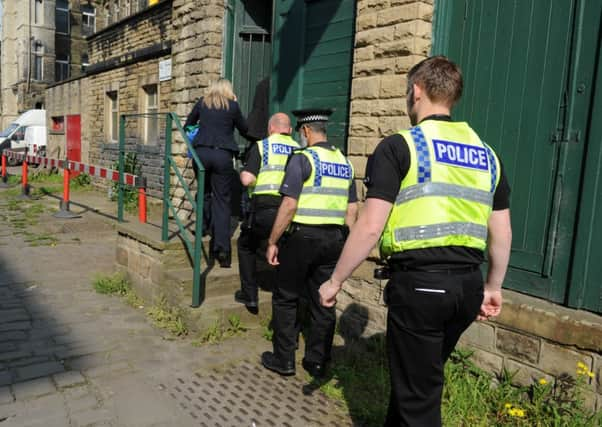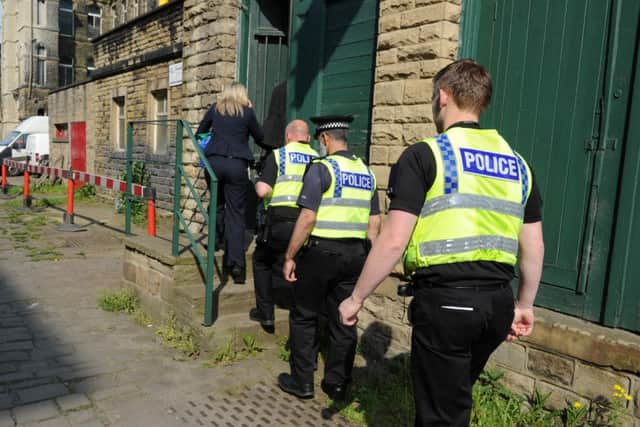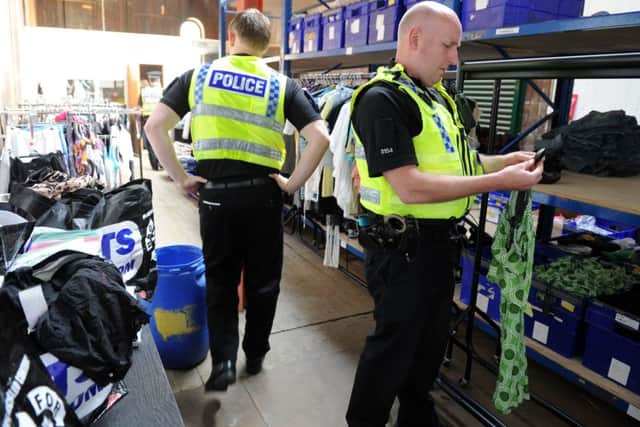Video: £9m of fake drugs seized in dawn raids


Potentially dangerous hauls of slimming pills, anabolic steroids and other drugs were uncovered as part of an international operation co-ordinated by Interpol leading to the arrests of 237 people.
The crackdown also targeted a huge illegal internet trade in medicines including more than 10,000 websites illegally selling medicines.
Advertisement
Hide AdAdvertisement
Hide AdIn the UK, 3.6 million doses of counterfeit medicines were seized by investigators from the Medicines and Healthcare Products Regulatory Agency (MHRA) and five people were arrested.


The Yorkshire Post was given exclusive access to operations in the region which included raids on domestic properties in Halifax and Denholme, near Bradford, and on warehousing in Keighley where anti-impotence drugs from India, which are unlicensed for sale in the UK, were uncovered wrapped in bin bags.
In a second raid, similar drugs were found at premises in Northallerton from where they were also being traded over the internet.
Overall these were the most commonly seized drugs in the UK with 1.2m doses found in total. Nearly 400,000 doses of slimming products and more than 330,000 doses of misused drugs among them sleeping pills, tranquilisers and antidepressants were also uncovered.
Advertisement
Hide AdAdvertisement
Hide AdThe majority of packages seized containing medicines supplied illegally originated from India and China.


A significant haul of tobacco was also uncovered in the raids in West Yorkshire. Agency officers backed by the police seized laptops which will now be examined as part of complex inquiries into the source of the drugs, as well as paper records from a business selling them which trades legitimately via the internet .
Danny Lee-Frost, head of operations at the MHRA’s enforcement team, said of major concern was the conditions used to store the drugs which are not licensed for sale in the UK.
“They were in loose blister packs in a drawer,” he said.
“There’s no packaging or instructions about when to take them or not to take them and some of the blister packs are cracked with the tablets showing through.
Advertisement
Hide AdAdvertisement
Hide Ad“Basically, it’s dangerous. A fake DVD or fake handbag isn’t going to kill you but fake medicines could.
“If you go on the internet and buy medicines from a site, you don’t know anything about them, you don’t know where they’ve been.”
Internationally, more than 8m doses of drugs were seized worth around £18.6m.
A breakdown of the UK seizures highlights a trend towards lifestyle medications that are unlicensed, adulterated or controlled by law.
Advertisement
Hide AdAdvertisement
Hide AdFor the first time the MHRA targeted YouTube accounts and videos as criminals seek to exploit new channels to profit from the illegal sale of medicines including social media.
The MHRA’s head of enforcement, Alastair Jeffrey, said: “The medicines recovered during these raids were being held in appalling conditions, such as a dirty old building with broken windows, with medicines lying on the floor in bin bags.
“Criminals involved in the illegal supply of medicines through the internet aren’t interested in your health; they are interested in your money. Whether they get this through selling you a potentially dangerous counterfeit or unlicensed drug or through stealing your bank details. To protect your health, visit your GP, get a correct diagnosis and buy medicines from a legitimate high street or online pharmacy.”
Ria Baxendale, from Border Force’s postal command, said: “Our involvement in this joint operation demonstrates our commitment to tackling the smuggling of fake and unlicensed medicines. These goods can be dangerous and those who profit from this illegal trade are often involved in other forms of serious organised crime.
Advertisement
Hide AdAdvertisement
Hide Ad“My message to the public is simple – don’t buy anything online unless you’re certain it comes from a legitimate manufacturer.”
Mr Lee-Frost said India was a key source of medication linked to booming sales of drugs for impotence.
These were manufactured legally under licence but could not be sold in the UK because there was no regulatory approval.
Users ordered them via the internet to avoid bringing up the issue with their doctor or because they did not want to pay for the drugs through licensed sources.
Advertisement
Hide AdAdvertisement
Hide AdA second other significant source of illegal medication was China where counterfeit drugs are manufactured illegally.
There was no regulation of the ingredients which left users ingesting potentially dangerous substances. Testing had revealed paint used to coat roads had been mixed into one batch, while rat poison had also been found. Testing was so sensitive that areas where the drugs had been manufactured could be pinpointed due to levels of coal dust from power stations or radiation from water close to nuclear power stations.
“Recently in the UK we’ve seen some high-quality counterfeits with the packaging but of course you don’t know what the ingredients are, how they are absorbed by the body, and if they have contaminants,” he said.
Many of the sellers were detected after parcels supplying the drugs were found by officials carrying out checks at international postal hubs including X-raying deliveries. Further checks are carried out and test purchases made.